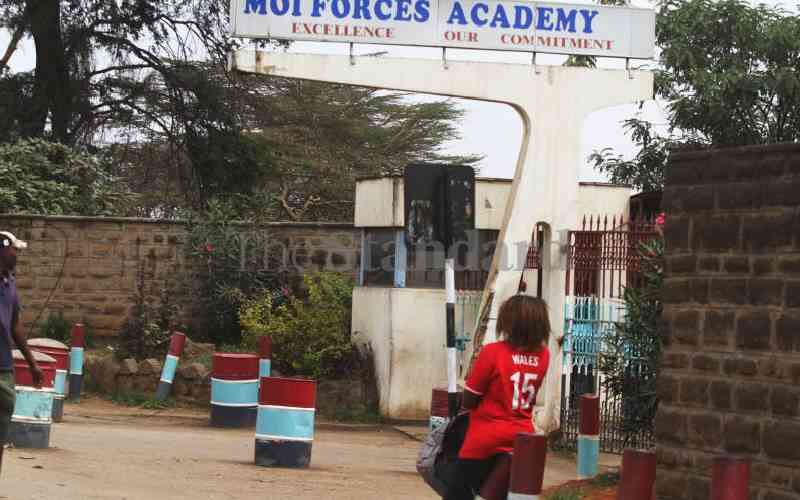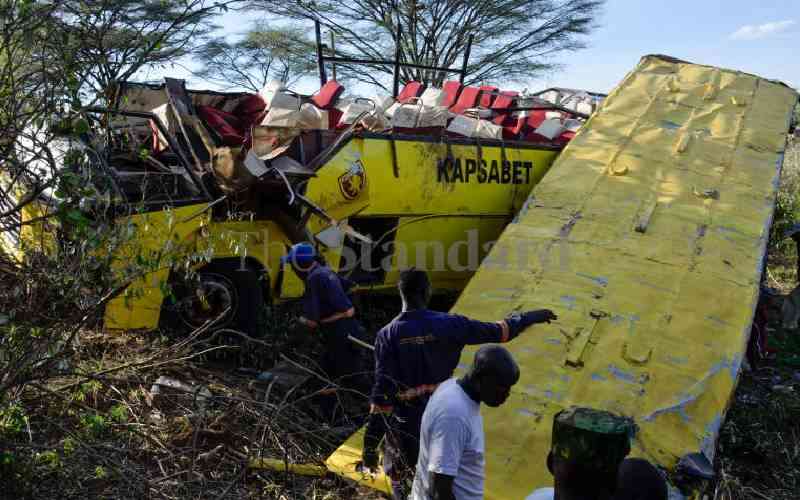 |
|
A man draws fuel from a road construction truck. |
By STANDARD REPORTER
NAIROBI; KENYA: Unscrupulous employees of a contractor working on the Southern bypass in Nairobi are illegally siphoning fuel and selling it to the public, putting more pressure on taxpayers.
Exclusive investigations by The Standard have established that the fishy deals run between 4am and 6am every day in the Lang’ata area under the watch of police officers.
So open is the business that the dealers have erected a ‘petrol station’ in the area where public service vehicles operating on the Ongata Rongai, Lang’ata, Madaraka and Nairobi West routes refuel.
Speaking in confidence, a Nairobi West matatu driver said the trade has been going on for close to two months, even as the public raised alarm over fuel smuggling at Lang’ata Police Station. “The fuel is sold to us at a discount. That is why you will get vehicles lining up early in the morning to fill their tanks,” said the driver.
Sources reveal that on average, six public service vehicles fetch fuel from the dealers. This translates to about 420 litres of fuel sold per day.
House in order
If the scam is not stopped, it means by completion of the project, millions of shillings would have been lost. Engineers say this sum can be used to construct several kilometres of the road. Sources say the cartel has the blessing of Lang’ata Police Station officers, a couple of China Road and Bridge Corporation (CRBC) employees and the Kenya National Highways Authority (KeNHA).
On Sunday, the authority said it was aware of the scam “but we have no control over it”.
“The theft has no impact on costing of the road construction. This is because this is a locked contract meaning no factor at all can affect the pricing of the works,” said Charles Njogu, the corporate affairs manager, KeNHA. Mr Njogu said they have already notified the contractor, CRBC to put their house in order.
“We are committed to ensuring that contracts linked to KeNHA are credible,” he said.
Analysts say such criminal activities have a huge impact on the construction sector, as fuel is one of the major inputs that determine pricing of contracts.
“Even if the authority argues that this development might not have an impact on pricing, the fact remains that Chinese contractors might have factored in such incidental costs when budgeting for the construction,” said Michael Njeru, a civil engineer in Nairobi.
According to Mr Njeru, the culture of theft of construction materials and inflation of their costs are the greatest risks facing the sector.
In the construction of Thika superhighway, a sharp increase in the cost of oil and other key construction materials saw the total cost go up by about Sh2.7 billion to Sh27 billion.
Stay informed. Subscribe to our newsletter
“The contractor, the engineer in-charge and some of the officers from Lang’ata Police Station should be questioned. This is an archaic culture that is tainting our image,” he said.
Early last week, the Energy Regulatory Commission (ERC) reviewed upwards the country’s fuel cost, a move that could lead to a spike in transport costs. The changes saw diesel prices go up by Sh3.70 a litre and super petrol by Sh1.34 in Nairobi due to reported increase in global fuel prices and a higher currency exchange rate.
“The average landed cost of super petrol increased by 3.32 per cent from US $981.80 (Sh85,416.60) per tonne in May to $1,014.40 (Sh88,252.80) per tonne in June,” said ERC.
Face the law
In an interview, Mr Shu, the manager in-charge of the construction project, said that they would take stern action against those involved in the illicit trade.
“We are a professional firm that seeks to do our work in a sound manner. The activity is regretted and we will work with authorities to ensure those accused face the law,” he said.
Retired President Mwai Kibaki commissioned the Southern bypass early this year. It runs from Kikuyu town, across Ngong Road and Langata Road to Mombasa Road.
The road provides an alternative avenue for heavy transit vehicles heading to Western, Uganda, Rwanda and the Democratic Republic of Congo. This means once completed, traffic congestion along Mombasa Road will reduce significantly.
The road is financed by the Government and a concessionary loan from China. In total, it is estimated that the construction will cost Sh17 billion. China provided about 85 per cent of the funds. The project is scheduled to be completed in 36 months.
Other Nairobi bypasses include the Northern bypass, which links Limuru Road to Thika Road, and the Eastern bypass that joins Mombasa Road to Kiambu-Ruiru Road.
Recently, the Government said users of bypasses will be required to pay some fees as it seeks to establish private management of the nation’s roads. “The required investments payback would be funded from the proceeds of toll revenues and any associated ancillary income related to the project,” Stanley Kamau, the director of the public private partnership unit at the Treasury said in a statement.
 The Standard Group Plc is a
multi-media organization with investments in media platforms spanning newspaper
print operations, television, radio broadcasting, digital and online services. The
Standard Group is recognized as a leading multi-media house in Kenya with a key
influence in matters of national and international interest.
The Standard Group Plc is a
multi-media organization with investments in media platforms spanning newspaper
print operations, television, radio broadcasting, digital and online services. The
Standard Group is recognized as a leading multi-media house in Kenya with a key
influence in matters of national and international interest.
 The Standard Group Plc is a
multi-media organization with investments in media platforms spanning newspaper
print operations, television, radio broadcasting, digital and online services. The
Standard Group is recognized as a leading multi-media house in Kenya with a key
influence in matters of national and international interest.
The Standard Group Plc is a
multi-media organization with investments in media platforms spanning newspaper
print operations, television, radio broadcasting, digital and online services. The
Standard Group is recognized as a leading multi-media house in Kenya with a key
influence in matters of national and international interest.









